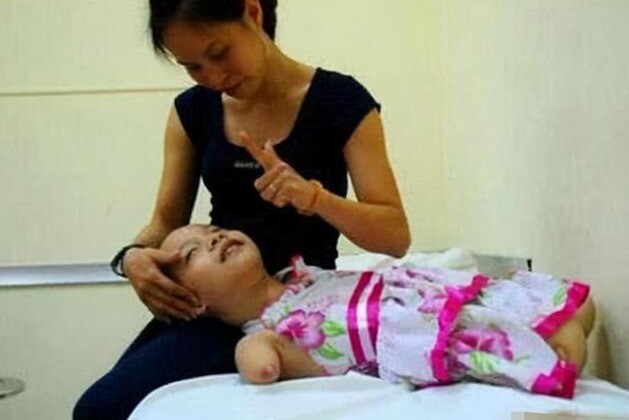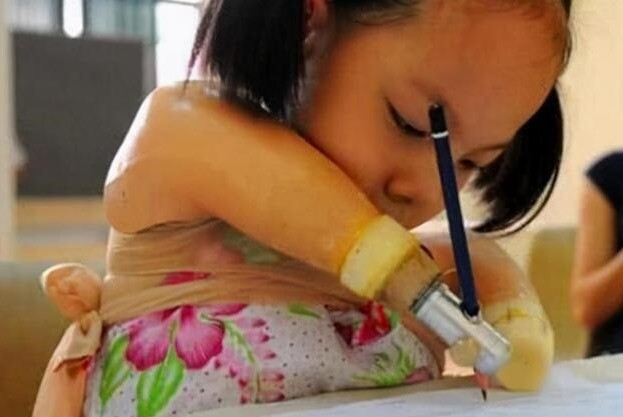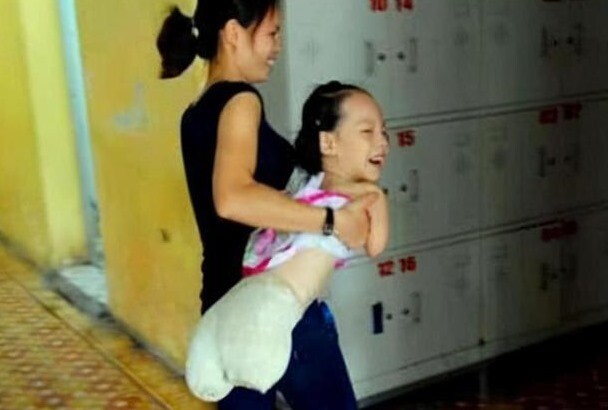The story of the Zhang family’s daughter, who was born with physical disabilities, captured the hearts of many and made headlines.
According to Ms. Zhang, she was informed during her pregnancy that her unborn child had a congenital disability and would be born without arms and legs.

This news came as a shock to Ms. Zhang and her husband. Ignoring the advice of others, Ms. Zhang chose to continue with the pregnancy, determined to bring her daughter into the world.
She talked to her unborn child every day, eagerly anticipating each movement. The baby, sensing her mother’s love, responded with strong kicks.
Despite the advance warning, Ms. Zhang was still taken aback when her daughter was born without arms and legs. She wept, thinking of the challenges that lay ahead for both of them.
Caring for a child with disabilities can be financially demanding. Ms. Zhang’s husband and mother-in-law wanted to abandon the baby, but she fiercely protected her child and was able to prevent them from doing so.

Ms. Zhang decided to quit her job to become a full-time mother, dedicating herself to the around-the-clock care of her daughter. She poured all her time and energy into ensuring her child’s well-being.
With her mother’s love and dedication, the little girl thrived. She grew into a beautiful, obedient, and well-mannered young lady.
Occasionally, the child would overhear insensitive remarks from others, and she would ask her mother, “Why can’t I run and play like the other children?”
Ms. Zhang, with a heavy heart, gently replied, “You are an angel with broken wings. One day, your wings will grow back.”
Empowered by her mother’s words, the little girl no longer felt self-conscious. She threw herself into her studies and consistently achieved top marks in her class.


Now, at the age of ten, the little girl has prosthetic limbs and can perform simple tasks like personal hygiene independently.
Witnessing his daughter’s growth and Ms. Zhang’s unwavering dedication, her husband and mother-in-law have softened their hearts. They now shower the child with love and attention, making up for the lack of it in her early years.
Being born with physical disabilities is already a challenge for any child. Therefore, it is crucial for parents to provide extra love, care, and education to boost their child’s confidence and ensure their well-being.
1. Unconditional Love and Acceptance:
Show your love: Embrace your child, speak words of affection, and let them know you love them unconditionally. This creates a sense of security and acceptance.
Accept the differences: Don’t try to change your child or compare them to others. Embrace their limitations and focus on their strengths.
Foster a loving family environment: A harmonious and loving family atmosphere will boost your child’s confidence and sense of comfort.
2. Encouraging Independence:
Provide opportunities for self-reliance: Allow your child to do things independently, no matter how small. For example, dressing, eating, or brushing their teeth. This fosters a sense of pride and boosts self-confidence.
Patiently guide: When your child faces challenges, patiently guide them step by step. Avoid doing things for them; instead, let them overcome obstacles on their own.
Praise and encourage: When your child accomplishes a task, offer praise and encouragement. This motivates them and boosts their self-belief.
3. Facilitating Social Integration:
Enroll in school: If possible, enroll your child in an inclusive or special school. School provides opportunities for social interaction, learning, and the development of social skills.
Engage in extracurricular activities: Involve your child in suitable extracurricular activities like art, music, or swimming. These activities enhance talents, broaden their social circle, and boost self-esteem.
Encourage community involvement: Encourage your child to participate in community activities like cleaning campaigns or helping the elderly. This instills a sense of contribution and boosts self-worth.
4. Focusing on Skill Development:
Language development: Converse with your child frequently, read to them, and encourage them to express themselves. This enhances their language skills and communication abilities.
Physical development: Engage your child in suitable physical activities to improve their physical health and dexterity.
Cognitive development: Stimulate your child’s cognitive development through intellectual games, life skill learning, and exploration of the world around them.
5. Seeking Expert Advice:
Consult professionals: Seek advice from doctors and psychologists to better understand your child’s condition and receive tailored guidance.
Join support groups: Connect with other parents of children with disabilities. These groups offer a platform to share experiences, learn from one another, and find emotional support.
6. Educating About Differences:
Explain their disability: Help your child understand their disability in simple terms. Teach them that it’s a part of who they are and nothing to be ashamed of.
Teach coping strategies: Prepare your child to handle teasing or discrimination. Instill self-confidence and resilience so that negative comments don’t affect them deeply.
Educate others: Teach those around you, including friends, family, and neighbors, about the importance of respecting people with disabilities and embracing differences.
7. Maintaining Optimism and Patience:
Believe in your child: Always believe in your child’s potential and provide unwavering encouragement and support.
Stay patient and persistent: Caring for and educating a child with disabilities can be challenging. Patience and perseverance are key.
Self-care: Don’t forget to take care of yourself. Make time for rest and activities that recharge you. This ensures you have the energy to provide the best care for your child.
The Hottest Trend for Reunification Day
The T-shirt with the slogan ‘Independence – Freedom – Happiness’ has become a favorite among Vietnamese youth, especially as the country draws near to its Independence Day celebrations on April 30th. This simple yet powerful statement celebrates the pride and spirit of the nation’s people, a true testament to the country’s rich history and culture.
3 Types of Families That Help Children Excel, Be Confident, and Adapt Well in Preschool
Every child has the potential to excel and shine. Nurturing this potential and creating an environment that fosters confidence and a love for learning is paramount. This introduction paragraph aims to delve into the three types of families that often create these outstanding children, and it is crucial to understand the dynamics that play a pivotal role in a child’s early education and their journey towards excellence.





































